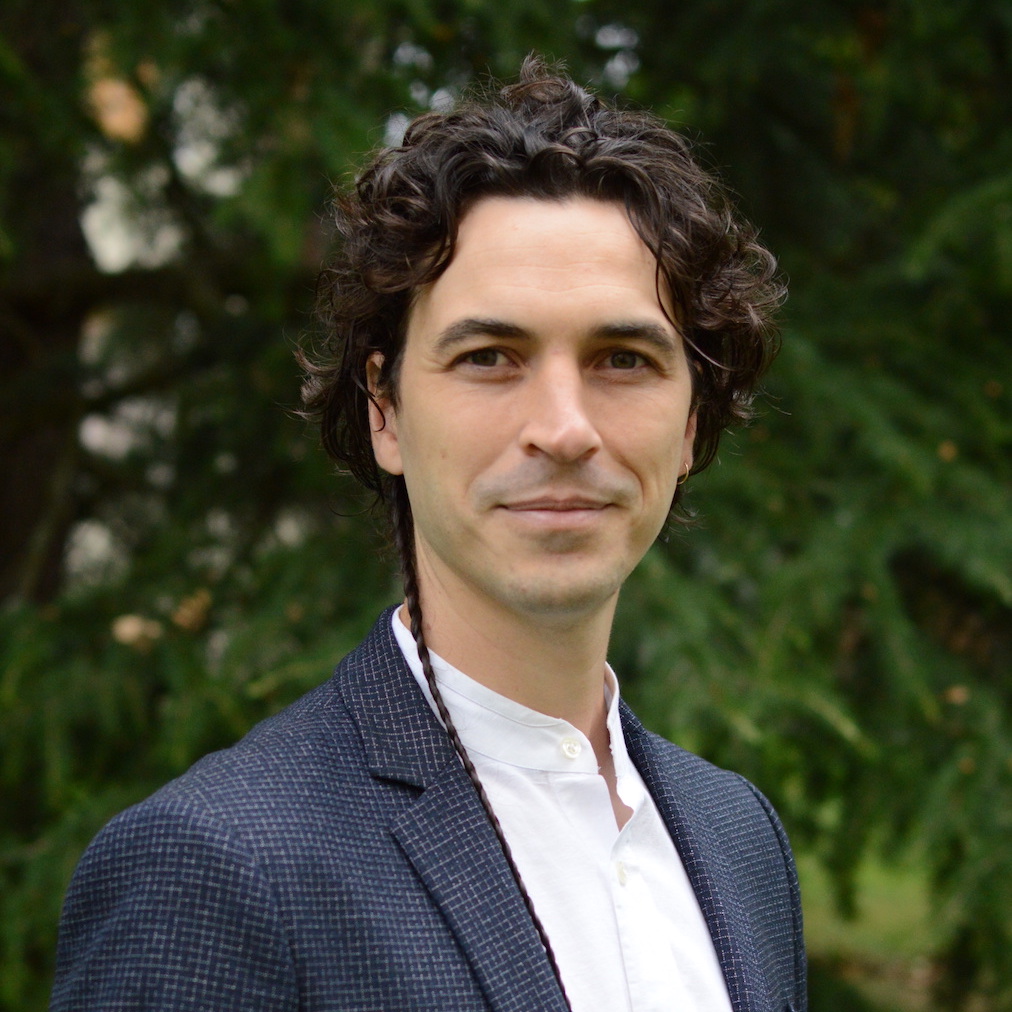In the News
Selected Press Coverage
-
LA DÉSINFORMATION CLIMATIQUE SE NORMALISE GRAVEMENT DANS LES MÉDIAS
Le changement climatique est devenu l’un des sujets les plus exposés à la désinformation.
La désinformation climatique ne se limite pas aux réseaux sociaux, elle se normalise de plus en plus dans les grands médias audiovisuels français. C’est ce que démontre une étude publiée le 10 avril par Data for Good, QuotaClimat et Science Feedback, trois ONGs spécialisées dans l’analyse du traitement médiatique des enjeux écologiques. Elles ont analysé les programmes d’information des dix-huit principales chaînes de télévision et de radio de janvier à mars 2025. Résultats : sur trois mois de temps d’antenne, 128 cas de désinformation climatique ont été détectés. Soit 10 par semaine. -
Climat : déni, infox ? la désinformation climatique gagne du terrain
De plus en plus d’influenceurs climato-sceptiques et certains responsables politiques répandent de fausses informations. Comment lutter contre ce type de désinformation ? Décryptage avec Marie-Eve Carignan, professeure à l’Université de Sherbrook et Emmanuel Vincent, fondateur et directeur exécutif de Science Feedback.
-
They’re getting smarter: How disinformation peddlers avoid regulation
Emmanuel Vincent, director of French fact-checking organization Science Feedback, told Rappler that platforms could stop serial disinformation actors by adjusting what they recommend their users to watch.
“Platforms should not take the risk of driving undue attention to misinformation by amplifying the content from serial misinformation sharers via their recommendation algorithms,” Vincent said.To better identify serial disinformation sharers, Vincent recommended that platforms check “all available information” on whether an owner of an account has a history of sharing disinformation, including those shared on other platforms.
“We increasingly see that misinformation sharers try and avoid breaking the rules of a given platform by inviting their followers to visit an external link or their profile on another platform with no moderation policies,” Vincent said. -
La science face à la désinformation climatique
Alors que la COP27 joue les prolongations et devrait officiellement se terminer ce samedi 19 novembre 2022, à Charm el-Cheikh en Égypte, la désinformation climatique bat son plein sur les réseaux. Les infox essayent frauduleusement d’opposer une idéologie face à un consensus scientifique sur le réchauffement climatique.
Invités :
– Eric Guilyardi, directeur de recherche au CNRS, co-rédacteur du 5e rapport du GIEC
– Emmanuel Vincent, docteur en Climatologie et fondateur de l’ONG Science Feedback. -
Fact-checkers around the world share their experiences with harassment
Other forms of harassment don’t originate from repressive regimes, but instead from disgruntled readers and content creators. Vincent, a French scientist and founder of Science Feedback, for instance, has observed routine harassment-like behavior from independent readers directed toward his organization.
-
As extreme weather increases, climate misinformation adapts
To climate scientists and misinformation researchers, claims like these mark an important shift: Instead of focusing on denialism, climate misinformation is getting local, focused on extreme weather events tied to a changing climate — such the Texas storm or recent wildfires that ravaged California and Australia.
-
As a bogus food safety video reaches 83 million on Facebook, fact checkers take up the fight against fake science
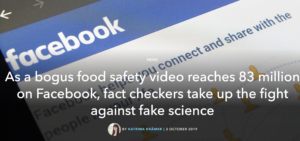
Emmanuel Vincent, director of Science Feedback, says that he doesn’t think that the first goal of fact checkers is to convince everybody ‘that what they say is correct or incorrect’. Instead, he hopes to have an impact on the wider information landscape. Science Feedback, another one of Facebook’s partners, focuses on misleading science in the mainstream media. ‘We are providing feedback to editors so that they become aware of major inaccuracies that are being published in their outlet – they might not have realised that before,’ Vincent explains.
-
“Ouvrez le 1”. Climat et fake news, le vrai du faux
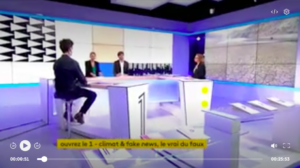
Une question / Plusieurs regards : Nicole d’Almeida, professeure en sciences de l’information et de la communication au CELSA-Sorbonne Université ; Emmanuel Vincent, climatologue, chercheur au Médialab de Sciences-po et fondateur de la plateforme Climate Feedback de vérification d’informations sur le réchauffement climatique.
-
Climate change in the era of fake news
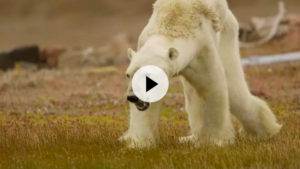
In this episode of Down to Earth, we look into why climate change has become the perfect target of fake news, and what you can do to protect yourself against it.
-
Climate change: ‘Fake news,’ real fallout
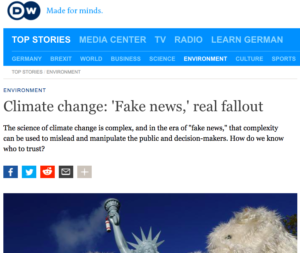
At a time when the online landscape is dominated by those who shout the loudest, the voices of climate experts like Vincent’s are at risk of being drowned out.
“People have come to realize the scale of the issue with the ‘fake news’ phenomenon,” he said. “The reach of this information is very hard to encompass, but fact-checkers are never going to be fast enough to check things in real time.”
-
At Climate Feedback, scientists encourage better science reporting. But who is listening?

“I don’t think we are exactly a fact-checking operation,” Vincent says. Unlike PolitiFact or FactCheck.org, Climate Feedback’s assessments come from scientists, not journalists. And the reviewers go beyond checking facts. “We try to ask scientists to also check the reasoning, the argumentation, and explanation of the facts. That’s really what science is about,” Vincent says.
-
Bad News Travels Fast
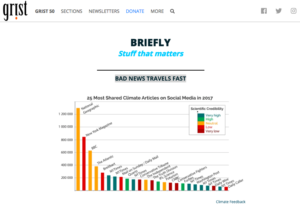
“We see a lot of inaccurate stories,” Emmanuel Vincent, a research scientist at the University of California and the founder of Climate Feedback, told Grist. Each scientist at Climate Feedback holds a Ph.D. and has recently published articles in peer-reviewed journals.
Vincent says that the New York Times and Washington Post are the two main sources that Climate Feedback has found “consistently publish information that is accurate and influential.” (He notes that Grist’s “Ice Apocalypse” by Eric Holthaus also made the credibility cut.)
“You need to find the line between being catchy and interesting without overstepping what the science can support,” he says.
-
Covering Climate Change, with Urgency and Creativity
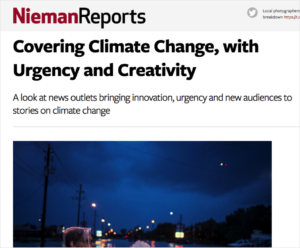
That has made it more crucial than ever that journalists are able to separate fact from opinion, says Emmanuel Vincent, a project scientist at the University of California, Merced, who launched the website Climate Feedback three years ago as a forum for scientists to weigh in on the accuracy of media coverage. “Rick Perry said that climate change is due to the oceans, and a journalist may just let it go and say that’s his opinion, but it contradicts reality,” he says. “It should be the job of the journalist to say that.””
-
Climate Scientists Launch Brainy Attack On Inaccurate News
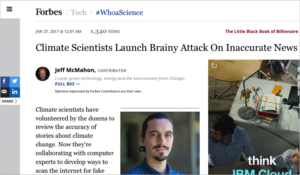
Climate scientists have volunteered by the dozens to review the accuracy of stories about climate change. Now they’re collaborating with computer experts to develop ways to scan the internet for fake and misleading stories about climate.
“The concept is to try to bring the scientists to have a voice of their own in this media environment, and the way we are doing it so far is by asking scientists to review articles for accuracy and credibility of information,” Emmanuel Vincent, founder of climatefeedback.org, said Thursday in Chicago.
[…] He told an overflowing crowd at the University of Chicago’s Computation Institute Thursday that his website’s purpose goes beyond fact checking, because there are other forms of misleading information, such as cherry-picked half truths, biased information, rhetorical manipulation, and ill-defined terms.
…
-
Can you trust what you read about climate change?
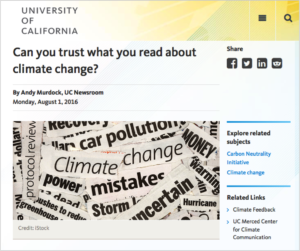
In January 2016, the final temperature measurements from the previous year were coming in from around the world. “2015 was hottest year in historical record, scientists say” declared a headline in The New York Times. The very same week, a headline from Forbes read “2015 was not even close to hottest year on record.”
In a world where the answer to a yes or no question like “Was it hotter last year than ever before?” is up for debate, how can you know what to believe?
Emmanuel Vincent and colleagues at the Center for Climate Communication at UC Merced had an idea: What if scientists could review online articles about climate change for accuracy?
Their online project, Climate Feedback, has made this a reality, powered by a growing group of Ph.D.s from around the world who volunteer their time to review articles on climate change in the mainstream media. There are currently over 100 scientists in the ranks at Climate Feedback, hailing from institutions all over the globe, with expertise in climate science and related topics including public health, food security, forestry and marine biology.
…
-
Quand les chercheurs en sciences du climat « fact-checkent » les articles de presse
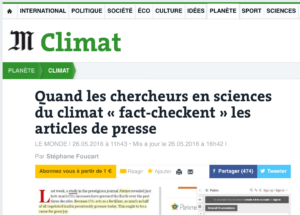
« Personne ne le dit jamais, mais dans bien des cas, le réchauffement climatique sera une bonne chose. » C’était le titre d’une tribune du célèbre climato-sceptique Bjorn Lomborg, publiée le 5 mai par The Telegraph. Hélas pour le quotidien britannique et le statisticien danois, quatorze chercheurs en sciences du climat se sont penchés sur l’argumentaire développé dans le texte : à peu près toutes les chevilles du raisonnement contreviennent à l’état des connaissances.
Ce « raid scientifique » sur le texte de Bjorn Lomborg, désormais affublé de surlignages et d’âpres commentaires, n’est pas le fruit du hasard ou d’une action isolée. Il est le résultat d’une initiative académique, Climate Feedback, lancée par l’université de Californie à Merced.
…
-
Critiquing climate coverage
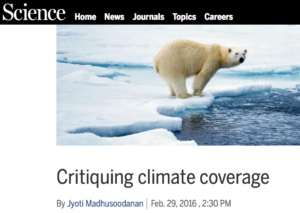
The goal, explains founder and University of California, Merced, project scientist Emmanuel Vincent, is to give scientists a voice and a means to impact the quality of the information that reaches the public. Both the scientists and journalists who work with the website believe that climate scientists can make a crucial impact on media coverage of this important topic. “Climate scientists have a form of information that is relevant to almost everyone on the planet,” says journalist Eric Holthaus, who requested that the group critique one of his pieces last summer. “Their discipline, whether they chose it for this reason or not, is a very political one. It makes sense for them to know that, and that their opinion matters beyond just academic circles.”
…
-
AP FACT CHECK: On climate science, most GOP candidates fail
(also in Fortune, PBS NewsHour , MSNBC)
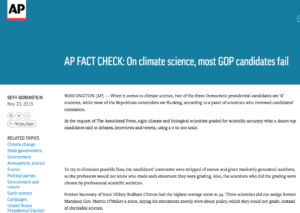
At the request of The Associated Press, eight climate and biological scientists graded for scientific accuracy what a dozen top candidates said in debates, interviews and tweets, using a 0 to 100 scale.
McCarthy, a former president of the American Association for the Advancement of Science, called Trump’s comments “nonsense,” while Emmanuel Vincent, a climate scientist at the University of California, Merced, said, “the candidate does not appear to have any commitment to accuracy.”
The eight scientists are Mann, Dessler, Elsner, McCarthy, Bradtmiller, Vincent, William Easterling at Pennsylvania State University and Matthew Huber at the University of New Hampshire.
-
Scientists get tool to mark online climate science media coverage and it’s not a rusty teaspoon
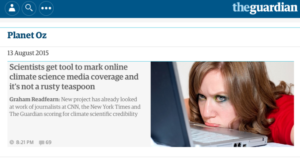
One growing community of scientists has a new tool at their disposal to assess the credibility of climate change stories and commentary online. And it’s not a rusty teaspoon. Using the Climate Feedback tool, scientists have started to diligently add detailed annotations to online content and have those notes appear alongside the story as it originally appeared.
[…] The project is the brainchild of climate scientist Dr Emmanuel Vincent, a tropical cyclone expert at the University of California. He told me:
As a climate scientist, one of my personal motivations is the frustration I have when I read some news on climate that I know are inconsistent with science and I have no efficient way of sharing this knowledge. I wanted to develop an effective and scalable way for scientists to share what they know with readers and journalists.
Also, many of my friends or colleagues –who do not have expertise in climate– are often genuinely confused by contradictory stories on climate change, for instance when one outlet says polar ice is melting and another says it isn’t. If my friends are confused, I’m sure there are plenty of others who could benefit from a thorough analysis by those knowledgeable on the topic.
-
National Public Radio segment on Climate Feedback
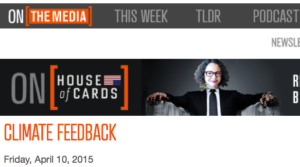
In the arena of climate change coverage, there is often a gap between science-based facts and what is actually reported. In efforts to remedy this, Climate Feedback is a collective of accredited scientists using a browser plugin to annotate climate change news. Bob speaks with the project’s founder and researcher at the University of California Merced’s Center for Climate Communication, Emmanuel Vincent.
-
How scientists are annotating climate reporting
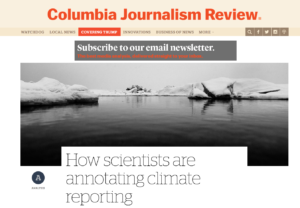
When melting ice disappears from the arctic, it exposes more of the ocean’s dark surface, which absorbs the sun’s warming rays. The water heats up and more ice melts, the cause and effect feeding each other in a example of a phenomenon known as climate feedback.
It’s an appropriate name for a group that’s attempting to slow some of the runaway misinformation about climate change, by doing what scientists do with their published work: review it.
-
Improving media coverage of climate science
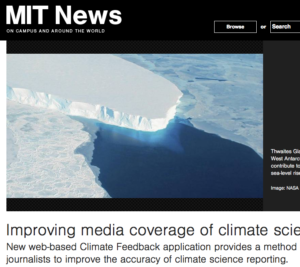
“The availability of accurate information is a necessity if we are to make good decisions about climate change as a society,” says Emmanuel Vincent, a postdoctoral associate at Yale University who recently completed a fellowship in MIT’s Department of Earth, Atmospheric, and Planetary Sciences (EAPS). “When I read something I know is incorrect, I can blog about it, but only a few people will read the post. Moreover, the comments below blog posts tend to get acrimonious. It depresses me.”
To improve the situation, Vincent channeled his frustration into launching Climate Feedback, a method that aims to help journalists, science writers, and scientists who write for the public, to assess the quality of their reporting on climate science and find better sources of information. It also allows the general public to investigate the accuracy of climate stories.
